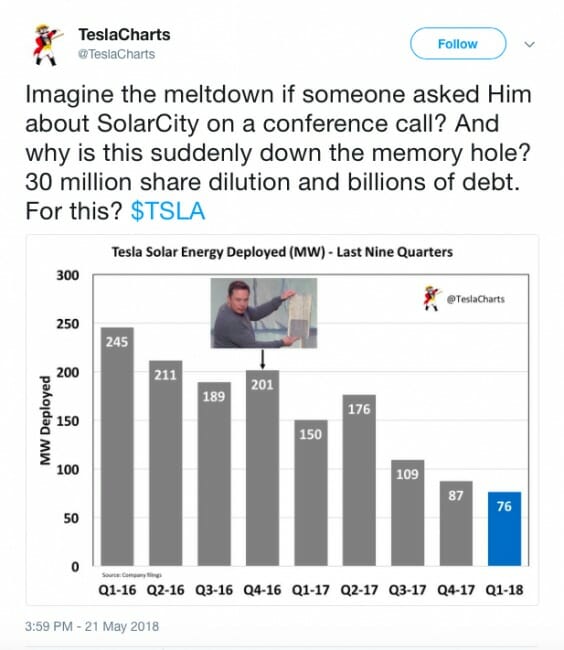Fixing Tesla
I promised I would not post any more Tesla for a while, and to some extent I am keeping that promise -- no updates here on the SEC investigation or the 420 tweet. But since I have been critical of Tesla in the past, I thought I would acknowledge that there are good things in Tesla that could and should be saved. The problem is that Tesla is saddled with a bunch of problems that are NOT going to be solved by going private. In fact, going private could only make things worse -- given that Tesla already has too much debt and its debt is rated barely above junk bonds, piling on more debt just to save Elon Musk from short sellers is not a good plan. Here is what I would suggest:
- Find the right role for Elon Musk. Musk HAS to be part of the company, without him its stock would go to about zero tomorrow. But right now he is CEO, effective head of media relations, factory manager, and chief engineer. Get him out of day to day management (and off Twitter) and hire real operating people who know what they are doing
- Get rid of the dealerships. Tesla tried to do something different, which is own all the dealerships rather than franchise them out. This is fine if one has some sort of vision for doing sales and service differently, but Tesla really doesn't. It does the same things as other car dealerships but just slower since it has not been able to build out capacity fast enough. And this decision has cost them a tons of growth capital they desperately need, because they have had to build out dealerships most car companies get for "free" because the capital for the dealerships is provided by third-party entrepreneurs. Also, the third-party entrepreneurs bring other things to the table, for example many of them tend to have experience in the car sales business and a high profile in their local markets with government and media.
- If possible, find a partner for the charging network. All traditional car companies get their fueling networks for free because the network is already built out by the oil companies. Tesla is building its own, and again this is sucking up a lot of capital. It is also dangerous, because Tesla has chosen to pursue a charging standard that may not become the industry standard (this is already happening in Europe) and Tesla risks being stuck with the betamax network. Tesla should see if it can shift this to a third party, perhaps even in joint venture with other EV companies.
- Do an equity raise. To my mind, it is absolute madness Tesla did not do this earlier in the year. Their stock was trading at $350 and at a $50+ billion valuation at the same time they were burning cash cash at a rate of $3 billion or so a year. Musk says he can skate through without more capital but he has said this before and it was not true. Given the enthusiasm for his stock, there is just no reason to run cash poor when there are millions of Tesla fanboys just waiting to throw money at the company. Even a $5 billion raise would have been only 10% dilution. Musk says he wants to burn the shorts but ask any Tesla short out there what they would most fear, and I think they would all say an equity capital raise. $3-5 billion would get Tesla at least through 2019 no matter how bad the cash burn remained and give the company space to solve its operational problems.
- Get someone who knows how to build cars building the cars. I have written about this before -- it is always hard when you are trying to be a disruptor of an industry to decide what to disrupt and what industry knowledge to incorporate. In retrospect, Musk's plan to ignore how cars are built and do it a different way is not working. Not only are the cost issues and throughput issues, but there are growing reports of real quality issues in model 3's. This has to be fixed ASAP.
- Bring some sanity to the long-term product roadmap. This may be a bit cynical, but Tesla seems to introduce a new product every time Musk needs to divert the public's attention, his equivalent of yelling "Squirrel!" There is the semi, a pickup truck, a roadster and probably something else I have forgotten about. Even the model 3 lineup is confusing, with no one really knowing what Tesla is going to focus on, and whether the promised $35,000 model 3 will ever actually be built. This confusion doesn't work well with investors at all, but Tesla has been able to make it work with customers, increasing the buzz around the company because no one ever seems to know what it will do next. But once real competitors start coming out from GM, Volvo, Jaguar, BMW and others, this is not going to work. Customers that are currently captive to Tesla will have other options. Let's start with the semi. The demo was a beautiful product, but frankly there is no way Tesla is going to have the time or the money to actually produce this thing. Someone like Volvo is going to beat them to the punch. They need to find a JV partner who can actually build it.
Update: If I had a #7, it would be: Invent a time machine and go back and undo the corrupt SolarCity buyout, in which Tesla bailed out Musk's friends and family and promptly proceeded to essentially shut down the company. Tesla shareholders got nothing from the purchase except a lot of debt.
